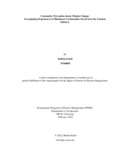| dc.contributor.advisor | Chowdhooree, Imon | |
| dc.contributor.author | Karki, Rubina | |
| dc.date.accessioned | 2023-03-05T09:20:20Z | |
| dc.date.available | 2023-03-05T09:20:20Z | |
| dc.date.copyright | 2022 | |
| dc.date.issued | 2022-02 | |
| dc.identifier.other | ID: 19168003 | |
| dc.identifier.uri | http://hdl.handle.net/10361/17941 | |
| dc.description | This thesis is submitted in partial fulfillment of the requirements for the degree of Master in Disaster Management, 2022. | en_US |
| dc.description | Cataloged from PDF version of Thesis. | |
| dc.description | Includes bibliographical references (pages 92-112). | |
| dc.description.abstract | There occurs a close relationship between tourism and climate, where the former is highly
dependent on the latter. Despite being a non-negligible contributor to climate change, the
tourism business can be considered as a highly climate-sensitive sector due to its close
connectivity to the natural environment and climatic conditions. Local perceptions play an
important role to understand climate change better, through redirecting the focus towards
empirical investigations that often might be overlooked by the modern science. The present
research assesses the perception of the local people who are dependent on tourism regarding
their understanding and impacts of climate change in their livelihood in different villages of
Manang district of Nepal. Manang is among the popular tourist locations of the country while
also being located in the Himalayan region. A total of 107 respondents were involved in the
study where 84 respondents were surveyed, followed by focus group discussions and
interviews. The local people perceived that the climate in their villages have been changing
with perceived increased summer and winter temperature, decreased snow fall and snow
coverage and reduced or erratic rainfall. Though these perceived changes were observed to
be positive for tourism, the stakeholders believe that these changes could negatively impact
their livelihood in the long run. Additionally, no adaptation plans have occurred yet since
the respondents do not feel the need for adaptation for the time being, however, they are
aware that actions must be taken to reduce the impacts of climate change on tourism in the
long run. In order to reduce the impacts, appropriate preventive measures and tourism in
climate change related policies should be implemented in the tourism sector of Nepal. | en_US |
| dc.description.statementofresponsibility | Rubina Karki | |
| dc.format.extent | 115 pages | |
| dc.language.iso | en | en_US |
| dc.publisher | Brac University | en_US |
| dc.rights | Brac University theses are protected by copyright. They may be viewed from this source for any purpose, but reproduction or distribution in any format is prohibited without written permission. | |
| dc.subject | Climate Change | en_US |
| dc.subject | Tourism Industry | en_US |
| dc.subject | Himalayan Communities | en_US |
| dc.subject | Nepal | en_US |
| dc.subject.lcsh | Climatic changes--Social aspects--Asia. | |
| dc.title | Community perception about climate change: Investigating experiences of Himalayan communities involved in the tourism industry | en_US |
| dc.type | Thesis | en_US |
| dc.contributor.department | Department of Architecture, Brac University | |
| dc.description.degree | M. Disaster Management | |

